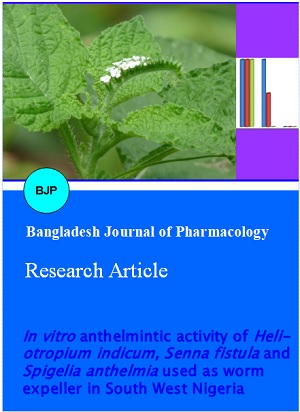In vitro anthelmintic activity of Heliotropium indicum, Senna fistula and Spigelia anthelmia used as worm expeller in South West Nigeria
DOI:
https://doi.org/10.3329/bjp.v10i2.22589Keywords:
Anthelmintic, Heliotropium indicum, Senna fistula, Spigelia anthelmia, Worm expellerAbstract
The anthelmintic potential of Heliotropium indicum, Senna fistula and Spigelia anthelmia were investigated using nematodes larvae from sheep and adult earthworms in order to justify the folkloric claim of the plants as worm expeller in south west of Nigeria. The acetone, ethanol, hydro-alcohol and distilled water extracts showed dose-dependent anthelmintic activities at the different concentrations (0.25, 0.50, 1.0 mg/mL) when tested against nematodes larvae. The order of anthelmintic effect for the plants was H. indicum> S. fistula> S. anthelmia. Acetone and ethanol extracts of the three plants showed the most effective activity (100% mortality) against adult earth worm (Pheretima posthuma) after 30 min of exposure The reference standard drug (Vermox®) showed less effectiveness compared to the medicinal plants used in the study. Overall, the study indicates that Heliotropium indicum, Senna fistula and Spigelia anthelmia are potential anthelmintic herbal drugs, which in turn validates the use of the three species as worm expellers by the Yorubas tribe of South West Nigeria.
Downloads
544
394 Read
291

Published
How to Cite
Issue
Section
License
Authors who publish with this journal agree to the following terms:
- Authors retain copyright and grant the journal right of first publication with the work simultaneously licensed under a Creative Commons Attribution License that allows others to share the work with an acknowledgement of the work's authorship and initial publication in this journal.
- Authors are able to enter into separate, additional contractual arrangements for the non-exclusive distribution of the journal's published version of the work (e.g., post it to an institutional repository or publish it in a book), with an acknowledgement of its initial publication in this journal.
- Authors are permitted and encouraged to post their work online (e.g., in institutional repositories or on their website) prior to and during the submission process, as it can lead to productive exchanges, as well as earlier and greater citation of published work (See The Effect of Open Access).
